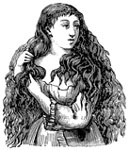
Weaknesses of Feminist Theology
IS “GOD THE MOTHER” JUST AS GOOD?
Feminist theologians have said they’ve looked within themselves and seen a Spirit feminine. If their writings tell the story of their search for the Godhead, then the Hebrew and Christian Testaments are the story of the Godhead’s search for them, and for all of us. God’s choice image is that He is the Bridegroom: and Israel, and the Church, and all of us, men and women, are the Bride.
For all their sensitivity to sex, many of the post-traditional feminist theologians are not sexual enough. Many identify the “female imagination” as being “meditative” and “fertile,” and then shy away, almost prudishly, from even imagining natural sex. Some even say their meditations become “fertile” parthenogenetically — that is, “not dependent on an external catalyst,” as Meinrad Craighead insists.
Craighead therefore abandons the sexual metaphor altogether — as it applies to human beings — and prefers the image of procreating from an unfertilized egg, as do certain insects, crustaceans, and worms — all because she will not bring a male generative act into her inward meditations.
Many feminist theologians believe that women have been withheld from full participation in the Christian mysteries. It would be truer to say, however, that it is only women who are admitted to the Christian mysteries, and that any men who would participate must first become “women.” This is because in traditional Christian mystical language all souls are feminine. (C.S. Lewis says something to the effect that the whole of creation is feminine in relation to the Creator.)
You May Also Enjoy
The possibility of a child coming into being without the agency of a human father is no longer scientifically incredible.
If Christ is so precious, perfect, loving, and wonderful, then what can be said of Mary of whom He is the fruit?
What gives meaning to daily life is the web of personal relationships we have either established and nurtured or neglected.

